Financial Reporting: IFRS Convergence and Implementation (BAO5535)
VerifiedAdded on 2023/06/07
|12
|3224
|314
Report
AI Summary
This report provides a comprehensive analysis of the convergence of International Financial Reporting Standards (IFRS). It begins by exploring the factors driving IFRS convergence from an institutional theory perspective, including coercive, mimetic, and normative factors. The report then delves int...
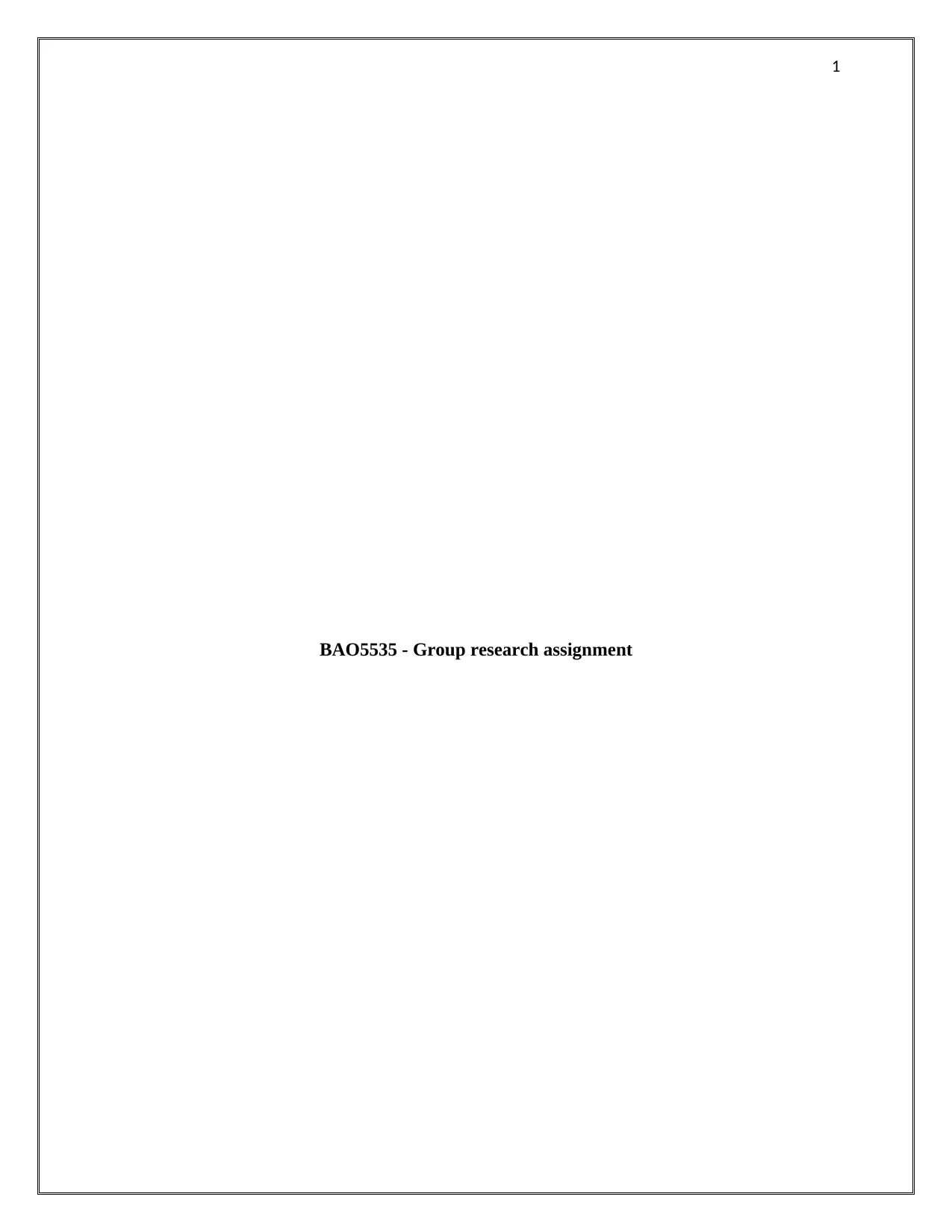
1
BAO5535 - Group research assignment
BAO5535 - Group research assignment
Paraphrase This Document
Need a fresh take? Get an instant paraphrase of this document with our AI Paraphraser
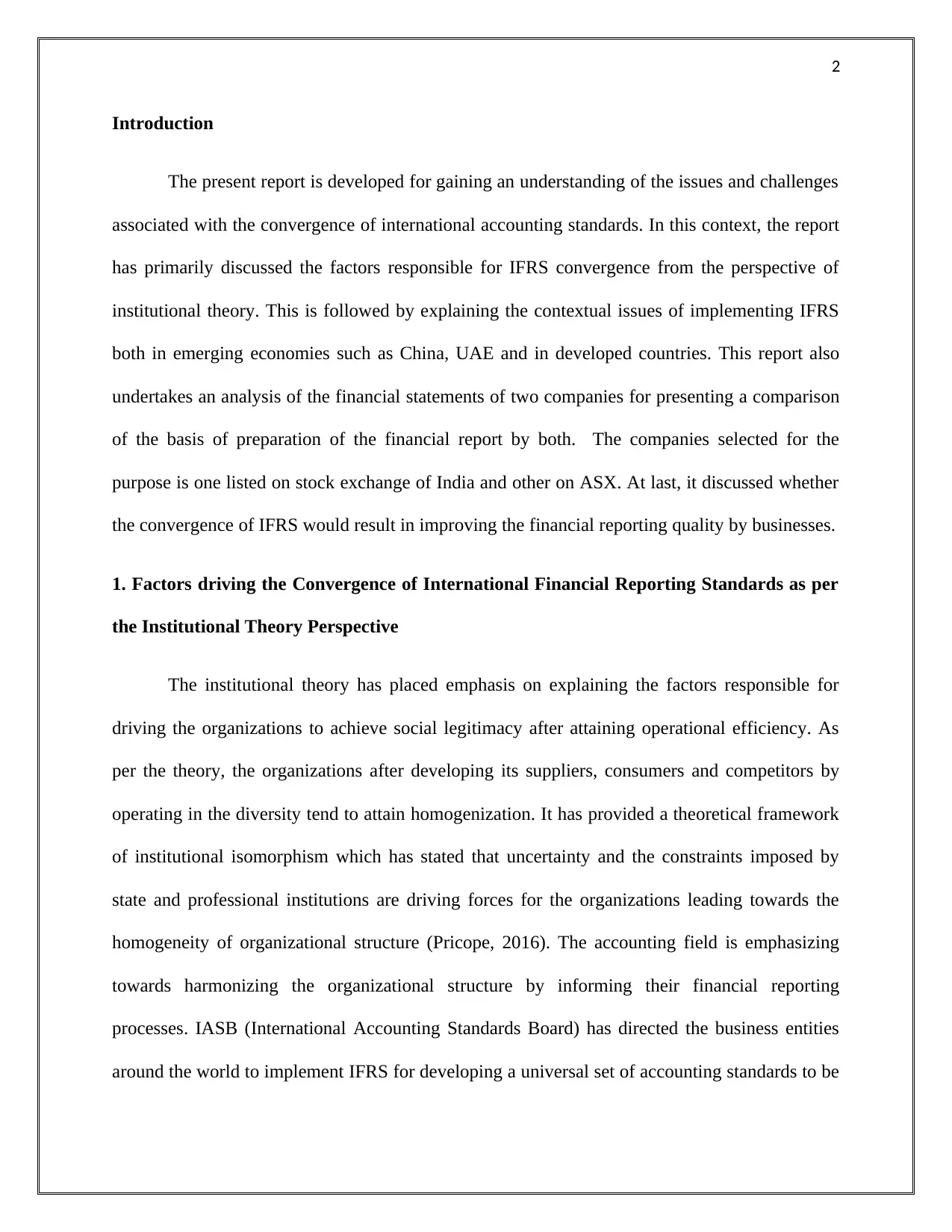
2
Introduction
The present report is developed for gaining an understanding of the issues and challenges
associated with the convergence of international accounting standards. In this context, the report
has primarily discussed the factors responsible for IFRS convergence from the perspective of
institutional theory. This is followed by explaining the contextual issues of implementing IFRS
both in emerging economies such as China, UAE and in developed countries. This report also
undertakes an analysis of the financial statements of two companies for presenting a comparison
of the basis of preparation of the financial report by both. The companies selected for the
purpose is one listed on stock exchange of India and other on ASX. At last, it discussed whether
the convergence of IFRS would result in improving the financial reporting quality by businesses.
1. Factors driving the Convergence of International Financial Reporting Standards as per
the Institutional Theory Perspective
The institutional theory has placed emphasis on explaining the factors responsible for
driving the organizations to achieve social legitimacy after attaining operational efficiency. As
per the theory, the organizations after developing its suppliers, consumers and competitors by
operating in the diversity tend to attain homogenization. It has provided a theoretical framework
of institutional isomorphism which has stated that uncertainty and the constraints imposed by
state and professional institutions are driving forces for the organizations leading towards the
homogeneity of organizational structure (Pricope, 2016). The accounting field is emphasizing
towards harmonizing the organizational structure by informing their financial reporting
processes. IASB (International Accounting Standards Board) has directed the business entities
around the world to implement IFRS for developing a universal set of accounting standards to be
Introduction
The present report is developed for gaining an understanding of the issues and challenges
associated with the convergence of international accounting standards. In this context, the report
has primarily discussed the factors responsible for IFRS convergence from the perspective of
institutional theory. This is followed by explaining the contextual issues of implementing IFRS
both in emerging economies such as China, UAE and in developed countries. This report also
undertakes an analysis of the financial statements of two companies for presenting a comparison
of the basis of preparation of the financial report by both. The companies selected for the
purpose is one listed on stock exchange of India and other on ASX. At last, it discussed whether
the convergence of IFRS would result in improving the financial reporting quality by businesses.
1. Factors driving the Convergence of International Financial Reporting Standards as per
the Institutional Theory Perspective
The institutional theory has placed emphasis on explaining the factors responsible for
driving the organizations to achieve social legitimacy after attaining operational efficiency. As
per the theory, the organizations after developing its suppliers, consumers and competitors by
operating in the diversity tend to attain homogenization. It has provided a theoretical framework
of institutional isomorphism which has stated that uncertainty and the constraints imposed by
state and professional institutions are driving forces for the organizations leading towards the
homogeneity of organizational structure (Pricope, 2016). The accounting field is emphasizing
towards harmonizing the organizational structure by informing their financial reporting
processes. IASB (International Accounting Standards Board) has directed the business entities
around the world to implement IFRS for developing a universal set of accounting standards to be
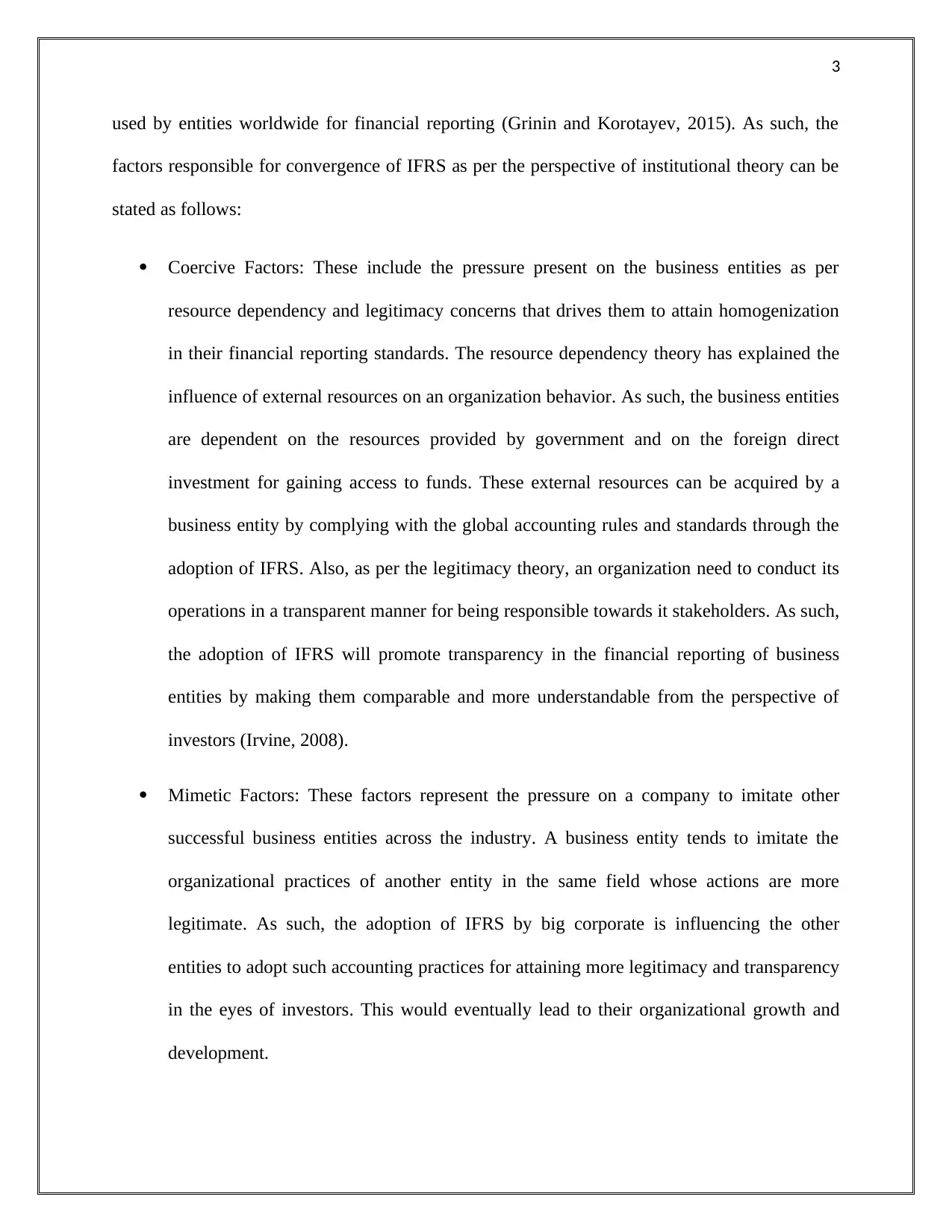
3
used by entities worldwide for financial reporting (Grinin and Korotayev, 2015). As such, the
factors responsible for convergence of IFRS as per the perspective of institutional theory can be
stated as follows:
Coercive Factors: These include the pressure present on the business entities as per
resource dependency and legitimacy concerns that drives them to attain homogenization
in their financial reporting standards. The resource dependency theory has explained the
influence of external resources on an organization behavior. As such, the business entities
are dependent on the resources provided by government and on the foreign direct
investment for gaining access to funds. These external resources can be acquired by a
business entity by complying with the global accounting rules and standards through the
adoption of IFRS. Also, as per the legitimacy theory, an organization need to conduct its
operations in a transparent manner for being responsible towards it stakeholders. As such,
the adoption of IFRS will promote transparency in the financial reporting of business
entities by making them comparable and more understandable from the perspective of
investors (Irvine, 2008).
Mimetic Factors: These factors represent the pressure on a company to imitate other
successful business entities across the industry. A business entity tends to imitate the
organizational practices of another entity in the same field whose actions are more
legitimate. As such, the adoption of IFRS by big corporate is influencing the other
entities to adopt such accounting practices for attaining more legitimacy and transparency
in the eyes of investors. This would eventually lead to their organizational growth and
development.
used by entities worldwide for financial reporting (Grinin and Korotayev, 2015). As such, the
factors responsible for convergence of IFRS as per the perspective of institutional theory can be
stated as follows:
Coercive Factors: These include the pressure present on the business entities as per
resource dependency and legitimacy concerns that drives them to attain homogenization
in their financial reporting standards. The resource dependency theory has explained the
influence of external resources on an organization behavior. As such, the business entities
are dependent on the resources provided by government and on the foreign direct
investment for gaining access to funds. These external resources can be acquired by a
business entity by complying with the global accounting rules and standards through the
adoption of IFRS. Also, as per the legitimacy theory, an organization need to conduct its
operations in a transparent manner for being responsible towards it stakeholders. As such,
the adoption of IFRS will promote transparency in the financial reporting of business
entities by making them comparable and more understandable from the perspective of
investors (Irvine, 2008).
Mimetic Factors: These factors represent the pressure on a company to imitate other
successful business entities across the industry. A business entity tends to imitate the
organizational practices of another entity in the same field whose actions are more
legitimate. As such, the adoption of IFRS by big corporate is influencing the other
entities to adopt such accounting practices for attaining more legitimacy and transparency
in the eyes of investors. This would eventually lead to their organizational growth and
development.
⊘ This is a preview!⊘
Do you want full access?
Subscribe today to unlock all pages.

Trusted by 1+ million students worldwide
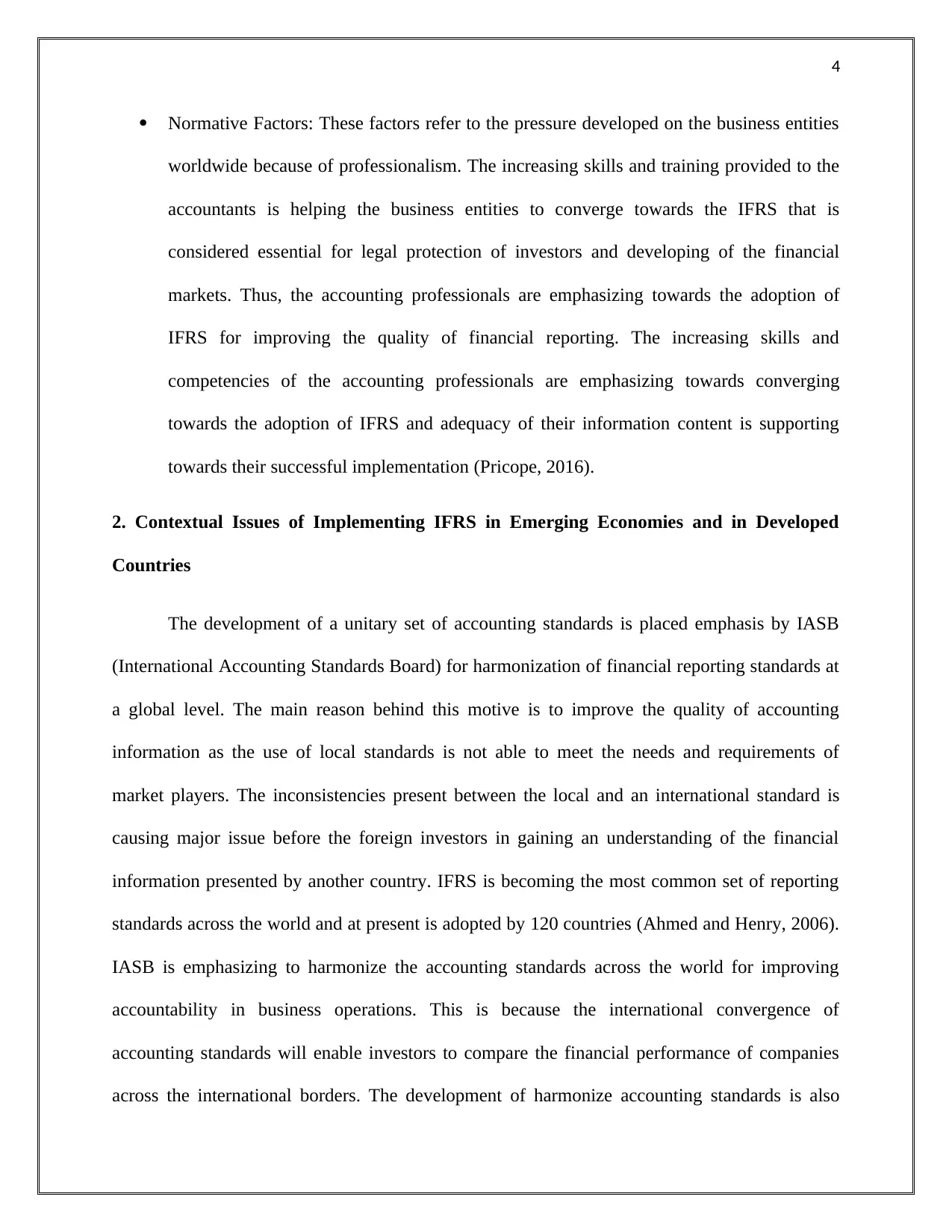
4
Normative Factors: These factors refer to the pressure developed on the business entities
worldwide because of professionalism. The increasing skills and training provided to the
accountants is helping the business entities to converge towards the IFRS that is
considered essential for legal protection of investors and developing of the financial
markets. Thus, the accounting professionals are emphasizing towards the adoption of
IFRS for improving the quality of financial reporting. The increasing skills and
competencies of the accounting professionals are emphasizing towards converging
towards the adoption of IFRS and adequacy of their information content is supporting
towards their successful implementation (Pricope, 2016).
2. Contextual Issues of Implementing IFRS in Emerging Economies and in Developed
Countries
The development of a unitary set of accounting standards is placed emphasis by IASB
(International Accounting Standards Board) for harmonization of financial reporting standards at
a global level. The main reason behind this motive is to improve the quality of accounting
information as the use of local standards is not able to meet the needs and requirements of
market players. The inconsistencies present between the local and an international standard is
causing major issue before the foreign investors in gaining an understanding of the financial
information presented by another country. IFRS is becoming the most common set of reporting
standards across the world and at present is adopted by 120 countries (Ahmed and Henry, 2006).
IASB is emphasizing to harmonize the accounting standards across the world for improving
accountability in business operations. This is because the international convergence of
accounting standards will enable investors to compare the financial performance of companies
across the international borders. The development of harmonize accounting standards is also
Normative Factors: These factors refer to the pressure developed on the business entities
worldwide because of professionalism. The increasing skills and training provided to the
accountants is helping the business entities to converge towards the IFRS that is
considered essential for legal protection of investors and developing of the financial
markets. Thus, the accounting professionals are emphasizing towards the adoption of
IFRS for improving the quality of financial reporting. The increasing skills and
competencies of the accounting professionals are emphasizing towards converging
towards the adoption of IFRS and adequacy of their information content is supporting
towards their successful implementation (Pricope, 2016).
2. Contextual Issues of Implementing IFRS in Emerging Economies and in Developed
Countries
The development of a unitary set of accounting standards is placed emphasis by IASB
(International Accounting Standards Board) for harmonization of financial reporting standards at
a global level. The main reason behind this motive is to improve the quality of accounting
information as the use of local standards is not able to meet the needs and requirements of
market players. The inconsistencies present between the local and an international standard is
causing major issue before the foreign investors in gaining an understanding of the financial
information presented by another country. IFRS is becoming the most common set of reporting
standards across the world and at present is adopted by 120 countries (Ahmed and Henry, 2006).
IASB is emphasizing to harmonize the accounting standards across the world for improving
accountability in business operations. This is because the international convergence of
accounting standards will enable investors to compare the financial performance of companies
across the international borders. The development of harmonize accounting standards is also
Paraphrase This Document
Need a fresh take? Get an instant paraphrase of this document with our AI Paraphraser
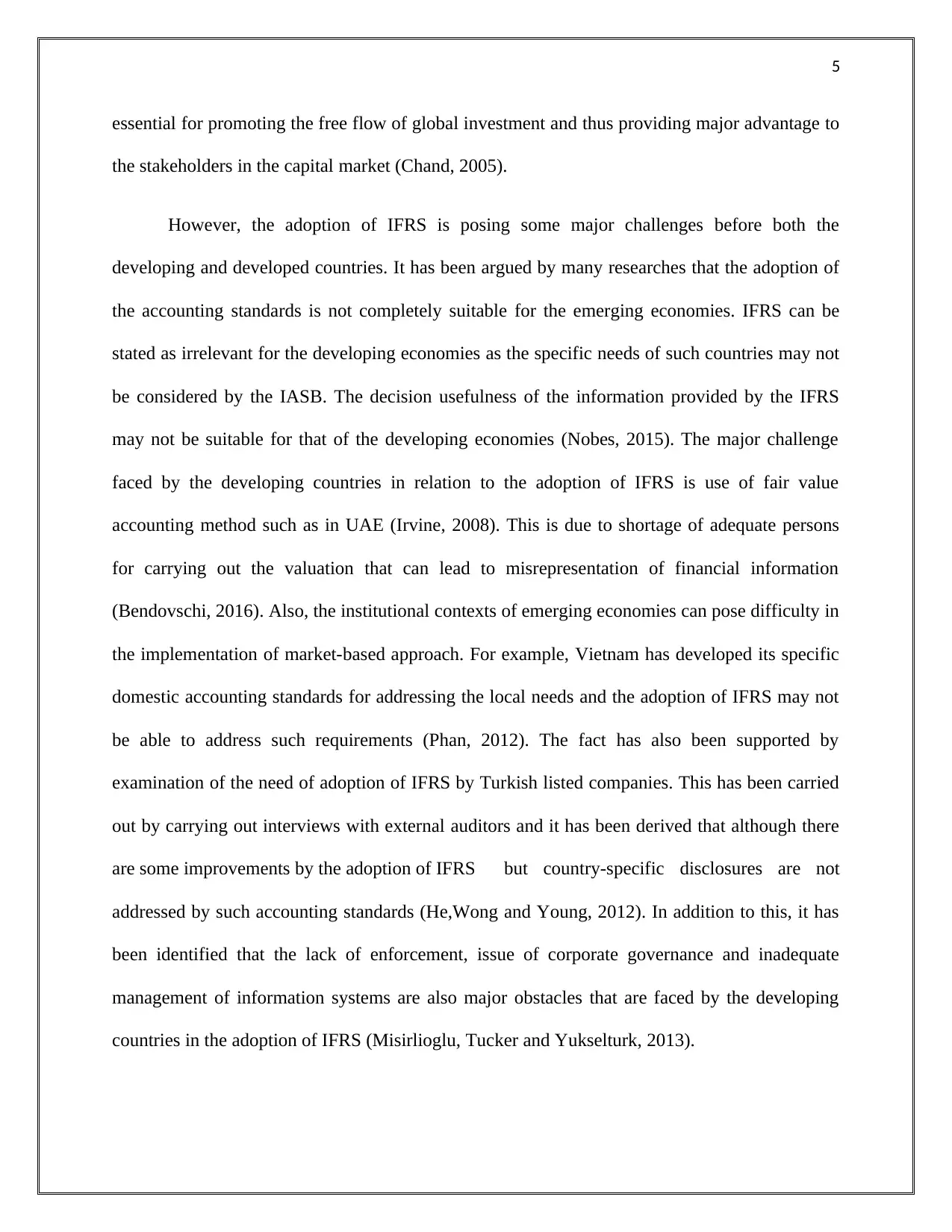
5
essential for promoting the free flow of global investment and thus providing major advantage to
the stakeholders in the capital market (Chand, 2005).
However, the adoption of IFRS is posing some major challenges before both the
developing and developed countries. It has been argued by many researches that the adoption of
the accounting standards is not completely suitable for the emerging economies. IFRS can be
stated as irrelevant for the developing economies as the specific needs of such countries may not
be considered by the IASB. The decision usefulness of the information provided by the IFRS
may not be suitable for that of the developing economies (Nobes, 2015). The major challenge
faced by the developing countries in relation to the adoption of IFRS is use of fair value
accounting method such as in UAE (Irvine, 2008). This is due to shortage of adequate persons
for carrying out the valuation that can lead to misrepresentation of financial information
(Bendovschi, 2016). Also, the institutional contexts of emerging economies can pose difficulty in
the implementation of market-based approach. For example, Vietnam has developed its specific
domestic accounting standards for addressing the local needs and the adoption of IFRS may not
be able to address such requirements (Phan, 2012). The fact has also been supported by
examination of the need of adoption of IFRS by Turkish listed companies. This has been carried
out by carrying out interviews with external auditors and it has been derived that although there
are some improvements by the adoption of IFRS but country-specific disclosures are not
addressed by such accounting standards (He,Wong and Young, 2012). In addition to this, it has
been identified that the lack of enforcement, issue of corporate governance and inadequate
management of information systems are also major obstacles that are faced by the developing
countries in the adoption of IFRS (Misirlioglu, Tucker and Yukselturk, 2013).
essential for promoting the free flow of global investment and thus providing major advantage to
the stakeholders in the capital market (Chand, 2005).
However, the adoption of IFRS is posing some major challenges before both the
developing and developed countries. It has been argued by many researches that the adoption of
the accounting standards is not completely suitable for the emerging economies. IFRS can be
stated as irrelevant for the developing economies as the specific needs of such countries may not
be considered by the IASB. The decision usefulness of the information provided by the IFRS
may not be suitable for that of the developing economies (Nobes, 2015). The major challenge
faced by the developing countries in relation to the adoption of IFRS is use of fair value
accounting method such as in UAE (Irvine, 2008). This is due to shortage of adequate persons
for carrying out the valuation that can lead to misrepresentation of financial information
(Bendovschi, 2016). Also, the institutional contexts of emerging economies can pose difficulty in
the implementation of market-based approach. For example, Vietnam has developed its specific
domestic accounting standards for addressing the local needs and the adoption of IFRS may not
be able to address such requirements (Phan, 2012). The fact has also been supported by
examination of the need of adoption of IFRS by Turkish listed companies. This has been carried
out by carrying out interviews with external auditors and it has been derived that although there
are some improvements by the adoption of IFRS but country-specific disclosures are not
addressed by such accounting standards (He,Wong and Young, 2012). In addition to this, it has
been identified that the lack of enforcement, issue of corporate governance and inadequate
management of information systems are also major obstacles that are faced by the developing
countries in the adoption of IFRS (Misirlioglu, Tucker and Yukselturk, 2013).
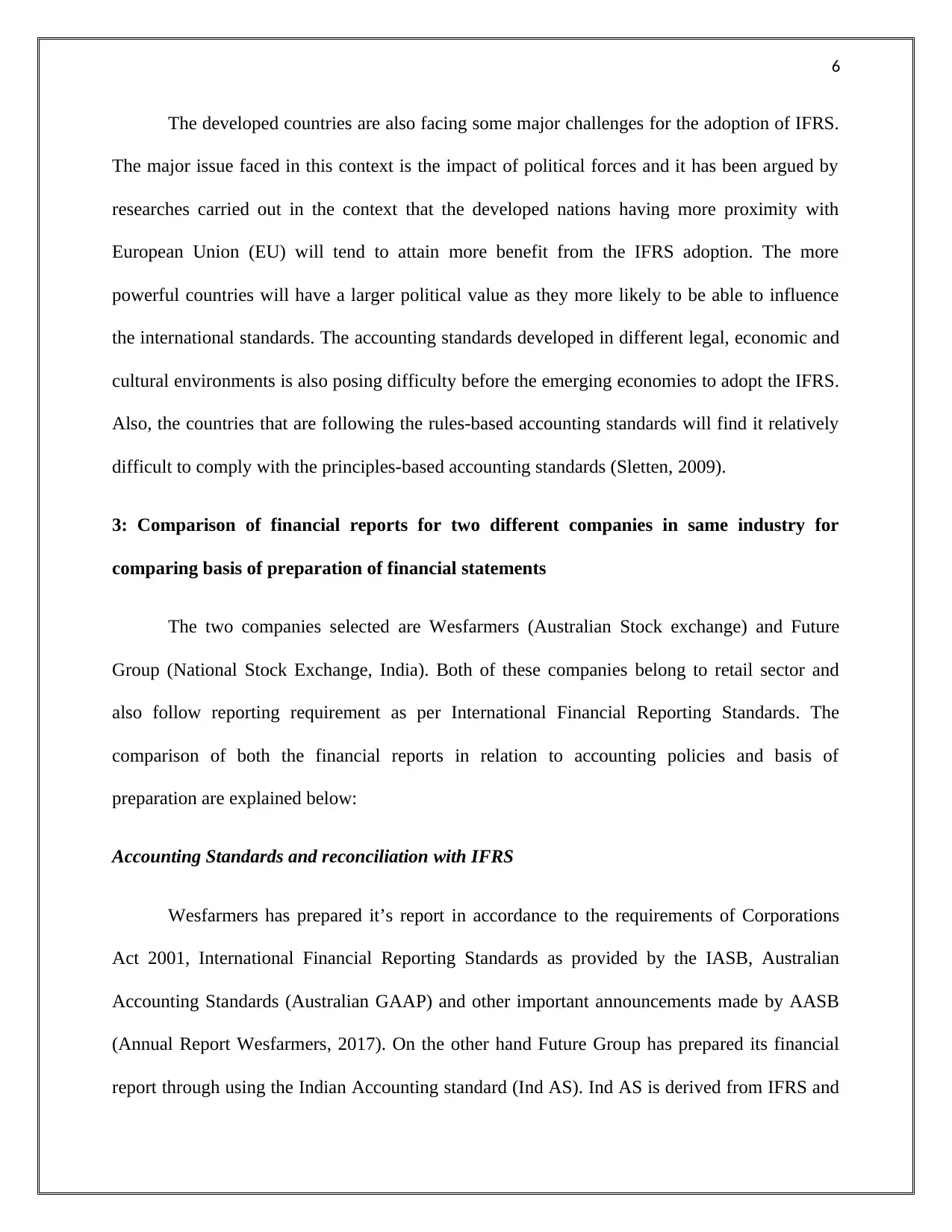
6
The developed countries are also facing some major challenges for the adoption of IFRS.
The major issue faced in this context is the impact of political forces and it has been argued by
researches carried out in the context that the developed nations having more proximity with
European Union (EU) will tend to attain more benefit from the IFRS adoption. The more
powerful countries will have a larger political value as they more likely to be able to influence
the international standards. The accounting standards developed in different legal, economic and
cultural environments is also posing difficulty before the emerging economies to adopt the IFRS.
Also, the countries that are following the rules-based accounting standards will find it relatively
difficult to comply with the principles-based accounting standards (Sletten, 2009).
3: Comparison of financial reports for two different companies in same industry for
comparing basis of preparation of financial statements
The two companies selected are Wesfarmers (Australian Stock exchange) and Future
Group (National Stock Exchange, India). Both of these companies belong to retail sector and
also follow reporting requirement as per International Financial Reporting Standards. The
comparison of both the financial reports in relation to accounting policies and basis of
preparation are explained below:
Accounting Standards and reconciliation with IFRS
Wesfarmers has prepared it’s report in accordance to the requirements of Corporations
Act 2001, International Financial Reporting Standards as provided by the IASB, Australian
Accounting Standards (Australian GAAP) and other important announcements made by AASB
(Annual Report Wesfarmers, 2017). On the other hand Future Group has prepared its financial
report through using the Indian Accounting standard (Ind AS). Ind AS is derived from IFRS and
The developed countries are also facing some major challenges for the adoption of IFRS.
The major issue faced in this context is the impact of political forces and it has been argued by
researches carried out in the context that the developed nations having more proximity with
European Union (EU) will tend to attain more benefit from the IFRS adoption. The more
powerful countries will have a larger political value as they more likely to be able to influence
the international standards. The accounting standards developed in different legal, economic and
cultural environments is also posing difficulty before the emerging economies to adopt the IFRS.
Also, the countries that are following the rules-based accounting standards will find it relatively
difficult to comply with the principles-based accounting standards (Sletten, 2009).
3: Comparison of financial reports for two different companies in same industry for
comparing basis of preparation of financial statements
The two companies selected are Wesfarmers (Australian Stock exchange) and Future
Group (National Stock Exchange, India). Both of these companies belong to retail sector and
also follow reporting requirement as per International Financial Reporting Standards. The
comparison of both the financial reports in relation to accounting policies and basis of
preparation are explained below:
Accounting Standards and reconciliation with IFRS
Wesfarmers has prepared it’s report in accordance to the requirements of Corporations
Act 2001, International Financial Reporting Standards as provided by the IASB, Australian
Accounting Standards (Australian GAAP) and other important announcements made by AASB
(Annual Report Wesfarmers, 2017). On the other hand Future Group has prepared its financial
report through using the Indian Accounting standard (Ind AS). Ind AS is derived from IFRS and
⊘ This is a preview!⊘
Do you want full access?
Subscribe today to unlock all pages.

Trusted by 1+ million students worldwide
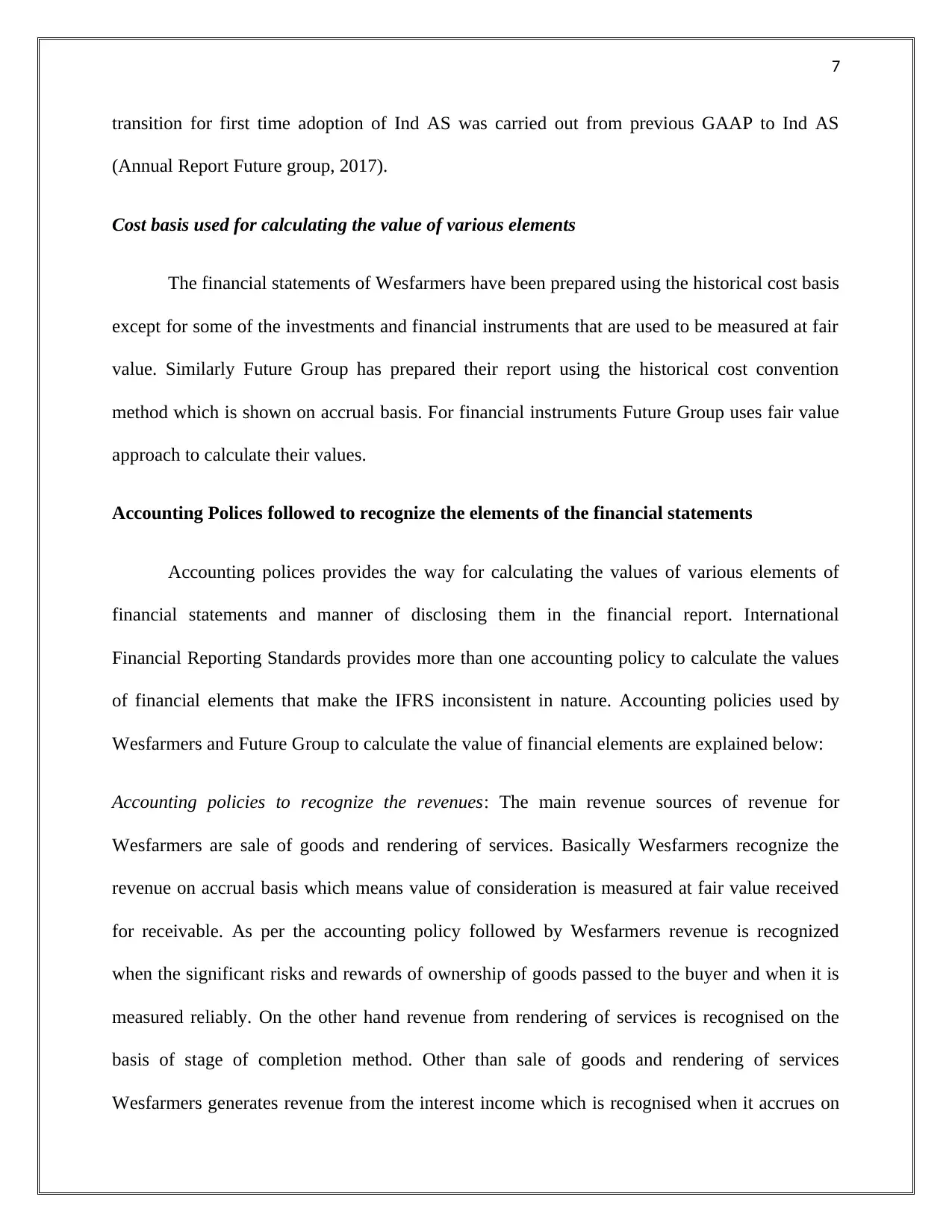
7
transition for first time adoption of Ind AS was carried out from previous GAAP to Ind AS
(Annual Report Future group, 2017).
Cost basis used for calculating the value of various elements
The financial statements of Wesfarmers have been prepared using the historical cost basis
except for some of the investments and financial instruments that are used to be measured at fair
value. Similarly Future Group has prepared their report using the historical cost convention
method which is shown on accrual basis. For financial instruments Future Group uses fair value
approach to calculate their values.
Accounting Polices followed to recognize the elements of the financial statements
Accounting polices provides the way for calculating the values of various elements of
financial statements and manner of disclosing them in the financial report. International
Financial Reporting Standards provides more than one accounting policy to calculate the values
of financial elements that make the IFRS inconsistent in nature. Accounting policies used by
Wesfarmers and Future Group to calculate the value of financial elements are explained below:
Accounting policies to recognize the revenues: The main revenue sources of revenue for
Wesfarmers are sale of goods and rendering of services. Basically Wesfarmers recognize the
revenue on accrual basis which means value of consideration is measured at fair value received
for receivable. As per the accounting policy followed by Wesfarmers revenue is recognized
when the significant risks and rewards of ownership of goods passed to the buyer and when it is
measured reliably. On the other hand revenue from rendering of services is recognised on the
basis of stage of completion method. Other than sale of goods and rendering of services
Wesfarmers generates revenue from the interest income which is recognised when it accrues on
transition for first time adoption of Ind AS was carried out from previous GAAP to Ind AS
(Annual Report Future group, 2017).
Cost basis used for calculating the value of various elements
The financial statements of Wesfarmers have been prepared using the historical cost basis
except for some of the investments and financial instruments that are used to be measured at fair
value. Similarly Future Group has prepared their report using the historical cost convention
method which is shown on accrual basis. For financial instruments Future Group uses fair value
approach to calculate their values.
Accounting Polices followed to recognize the elements of the financial statements
Accounting polices provides the way for calculating the values of various elements of
financial statements and manner of disclosing them in the financial report. International
Financial Reporting Standards provides more than one accounting policy to calculate the values
of financial elements that make the IFRS inconsistent in nature. Accounting policies used by
Wesfarmers and Future Group to calculate the value of financial elements are explained below:
Accounting policies to recognize the revenues: The main revenue sources of revenue for
Wesfarmers are sale of goods and rendering of services. Basically Wesfarmers recognize the
revenue on accrual basis which means value of consideration is measured at fair value received
for receivable. As per the accounting policy followed by Wesfarmers revenue is recognized
when the significant risks and rewards of ownership of goods passed to the buyer and when it is
measured reliably. On the other hand revenue from rendering of services is recognised on the
basis of stage of completion method. Other than sale of goods and rendering of services
Wesfarmers generates revenue from the interest income which is recognised when it accrues on
Paraphrase This Document
Need a fresh take? Get an instant paraphrase of this document with our AI Paraphraser
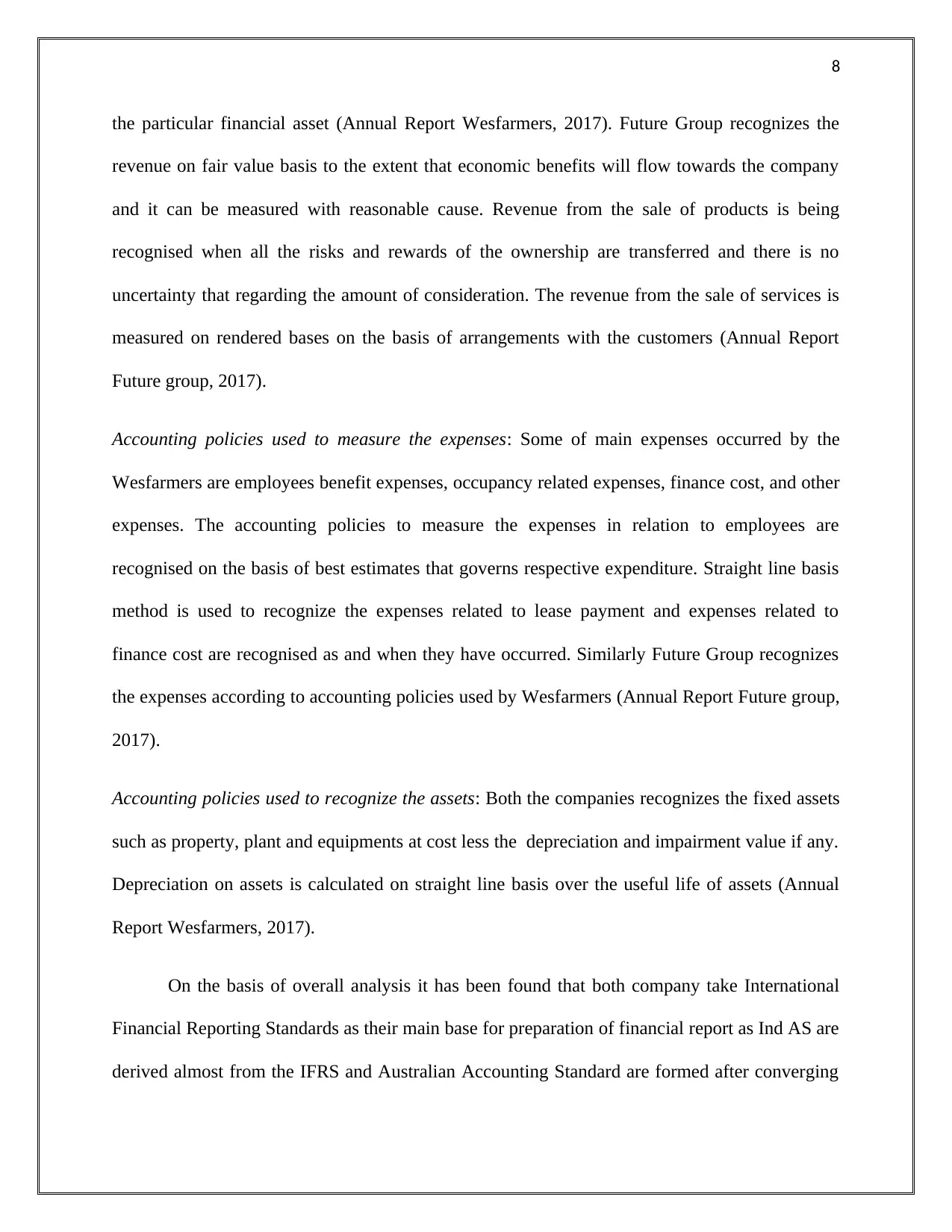
8
the particular financial asset (Annual Report Wesfarmers, 2017). Future Group recognizes the
revenue on fair value basis to the extent that economic benefits will flow towards the company
and it can be measured with reasonable cause. Revenue from the sale of products is being
recognised when all the risks and rewards of the ownership are transferred and there is no
uncertainty that regarding the amount of consideration. The revenue from the sale of services is
measured on rendered bases on the basis of arrangements with the customers (Annual Report
Future group, 2017).
Accounting policies used to measure the expenses: Some of main expenses occurred by the
Wesfarmers are employees benefit expenses, occupancy related expenses, finance cost, and other
expenses. The accounting policies to measure the expenses in relation to employees are
recognised on the basis of best estimates that governs respective expenditure. Straight line basis
method is used to recognize the expenses related to lease payment and expenses related to
finance cost are recognised as and when they have occurred. Similarly Future Group recognizes
the expenses according to accounting policies used by Wesfarmers (Annual Report Future group,
2017).
Accounting policies used to recognize the assets: Both the companies recognizes the fixed assets
such as property, plant and equipments at cost less the depreciation and impairment value if any.
Depreciation on assets is calculated on straight line basis over the useful life of assets (Annual
Report Wesfarmers, 2017).
On the basis of overall analysis it has been found that both company take International
Financial Reporting Standards as their main base for preparation of financial report as Ind AS are
derived almost from the IFRS and Australian Accounting Standard are formed after converging
the particular financial asset (Annual Report Wesfarmers, 2017). Future Group recognizes the
revenue on fair value basis to the extent that economic benefits will flow towards the company
and it can be measured with reasonable cause. Revenue from the sale of products is being
recognised when all the risks and rewards of the ownership are transferred and there is no
uncertainty that regarding the amount of consideration. The revenue from the sale of services is
measured on rendered bases on the basis of arrangements with the customers (Annual Report
Future group, 2017).
Accounting policies used to measure the expenses: Some of main expenses occurred by the
Wesfarmers are employees benefit expenses, occupancy related expenses, finance cost, and other
expenses. The accounting policies to measure the expenses in relation to employees are
recognised on the basis of best estimates that governs respective expenditure. Straight line basis
method is used to recognize the expenses related to lease payment and expenses related to
finance cost are recognised as and when they have occurred. Similarly Future Group recognizes
the expenses according to accounting policies used by Wesfarmers (Annual Report Future group,
2017).
Accounting policies used to recognize the assets: Both the companies recognizes the fixed assets
such as property, plant and equipments at cost less the depreciation and impairment value if any.
Depreciation on assets is calculated on straight line basis over the useful life of assets (Annual
Report Wesfarmers, 2017).
On the basis of overall analysis it has been found that both company take International
Financial Reporting Standards as their main base for preparation of financial report as Ind AS are
derived almost from the IFRS and Australian Accounting Standard are formed after converging
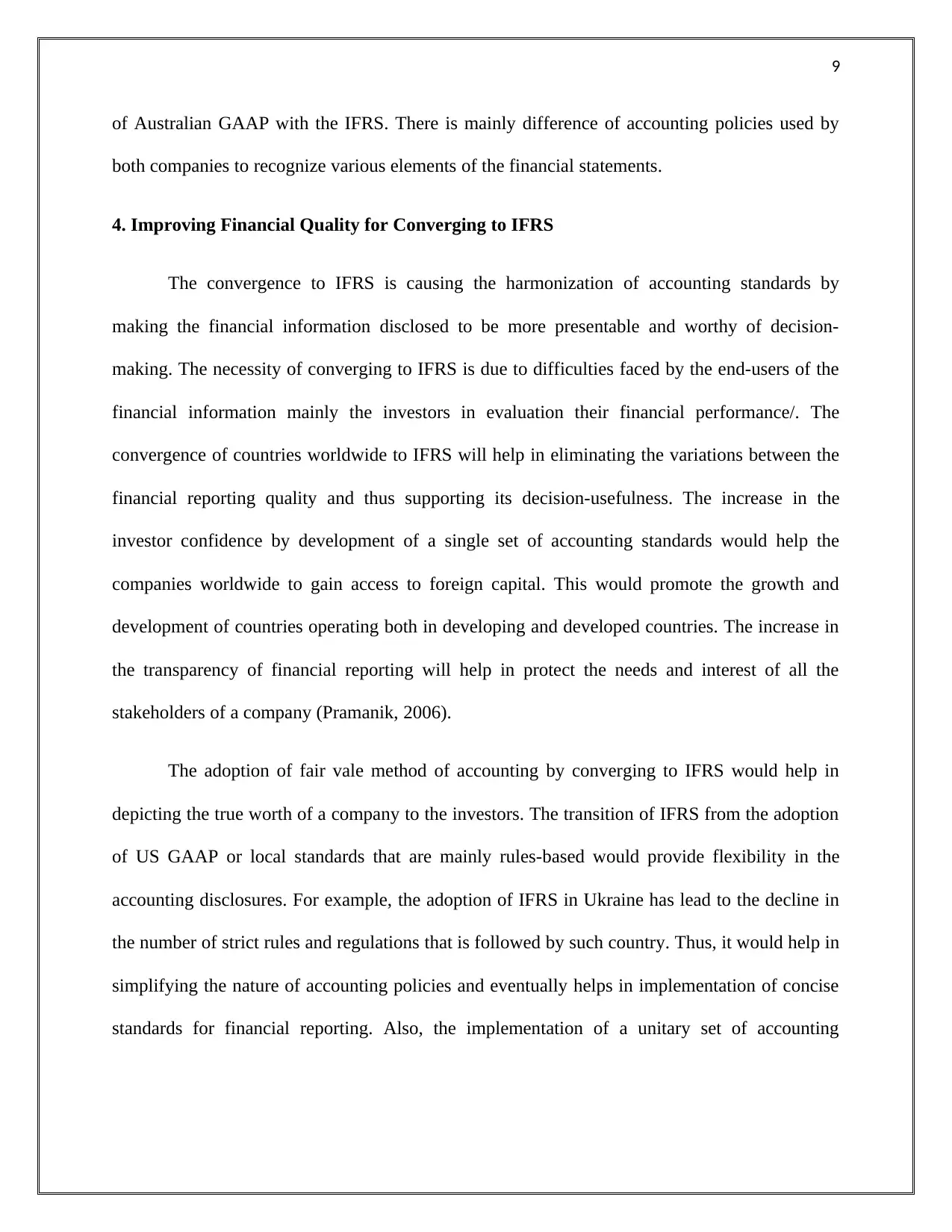
9
of Australian GAAP with the IFRS. There is mainly difference of accounting policies used by
both companies to recognize various elements of the financial statements.
4. Improving Financial Quality for Converging to IFRS
The convergence to IFRS is causing the harmonization of accounting standards by
making the financial information disclosed to be more presentable and worthy of decision-
making. The necessity of converging to IFRS is due to difficulties faced by the end-users of the
financial information mainly the investors in evaluation their financial performance/. The
convergence of countries worldwide to IFRS will help in eliminating the variations between the
financial reporting quality and thus supporting its decision-usefulness. The increase in the
investor confidence by development of a single set of accounting standards would help the
companies worldwide to gain access to foreign capital. This would promote the growth and
development of countries operating both in developing and developed countries. The increase in
the transparency of financial reporting will help in protect the needs and interest of all the
stakeholders of a company (Pramanik, 2006).
The adoption of fair vale method of accounting by converging to IFRS would help in
depicting the true worth of a company to the investors. The transition of IFRS from the adoption
of US GAAP or local standards that are mainly rules-based would provide flexibility in the
accounting disclosures. For example, the adoption of IFRS in Ukraine has lead to the decline in
the number of strict rules and regulations that is followed by such country. Thus, it would help in
simplifying the nature of accounting policies and eventually helps in implementation of concise
standards for financial reporting. Also, the implementation of a unitary set of accounting
of Australian GAAP with the IFRS. There is mainly difference of accounting policies used by
both companies to recognize various elements of the financial statements.
4. Improving Financial Quality for Converging to IFRS
The convergence to IFRS is causing the harmonization of accounting standards by
making the financial information disclosed to be more presentable and worthy of decision-
making. The necessity of converging to IFRS is due to difficulties faced by the end-users of the
financial information mainly the investors in evaluation their financial performance/. The
convergence of countries worldwide to IFRS will help in eliminating the variations between the
financial reporting quality and thus supporting its decision-usefulness. The increase in the
investor confidence by development of a single set of accounting standards would help the
companies worldwide to gain access to foreign capital. This would promote the growth and
development of countries operating both in developing and developed countries. The increase in
the transparency of financial reporting will help in protect the needs and interest of all the
stakeholders of a company (Pramanik, 2006).
The adoption of fair vale method of accounting by converging to IFRS would help in
depicting the true worth of a company to the investors. The transition of IFRS from the adoption
of US GAAP or local standards that are mainly rules-based would provide flexibility in the
accounting disclosures. For example, the adoption of IFRS in Ukraine has lead to the decline in
the number of strict rules and regulations that is followed by such country. Thus, it would help in
simplifying the nature of accounting policies and eventually helps in implementation of concise
standards for financial reporting. Also, the implementation of a unitary set of accounting
⊘ This is a preview!⊘
Do you want full access?
Subscribe today to unlock all pages.

Trusted by 1+ million students worldwide

10
standards would decrease the number of financial statements prepared and thus would reduce the
operating costs (Horton, 2008).
The global convergence of accounting standard would also result in facilitating the cross-
border mergers and acquisitions. This would eventually result in growth of business communities
across the globe leading to better capital inflows within the market. The increasing consistency
by the adoption of a common set of reporting system would help in easy interpretation of
financial statements by the end-users. Th public and communities can also easily gain an
understanding of the financial performance of a company who lacks the professional
understanding in interpretation of statements. However, there are some challenges that are
present before both the developed and developing economies restricting them to adopt the IFRS.
In this context, IASB is required to gain an analysis of such issues and guiding both types of
countries to successfully adopt the IFRS (Sletten, 2009).
Conclusion
It can be stated from the overall analysis carried out in the report that the main factors
that are responsible for converging to IFRS are coercive, mimetic and normative factors. The
contextual issues that are mainly faced by developing countries are lack of adequate personnel
and resources to adopt the IFRS. The developed nations are also facing political influences that
are hindering heir adoption of IFRS. However, it is recommended to adopt the use of IFRS for
business entities worldwide to improve the quality of financial information disclosed around the
world. This would helps in protecting the interest of the investors and increased flow of capital in
the market by achieving investor confidence.
standards would decrease the number of financial statements prepared and thus would reduce the
operating costs (Horton, 2008).
The global convergence of accounting standard would also result in facilitating the cross-
border mergers and acquisitions. This would eventually result in growth of business communities
across the globe leading to better capital inflows within the market. The increasing consistency
by the adoption of a common set of reporting system would help in easy interpretation of
financial statements by the end-users. Th public and communities can also easily gain an
understanding of the financial performance of a company who lacks the professional
understanding in interpretation of statements. However, there are some challenges that are
present before both the developed and developing economies restricting them to adopt the IFRS.
In this context, IASB is required to gain an analysis of such issues and guiding both types of
countries to successfully adopt the IFRS (Sletten, 2009).
Conclusion
It can be stated from the overall analysis carried out in the report that the main factors
that are responsible for converging to IFRS are coercive, mimetic and normative factors. The
contextual issues that are mainly faced by developing countries are lack of adequate personnel
and resources to adopt the IFRS. The developed nations are also facing political influences that
are hindering heir adoption of IFRS. However, it is recommended to adopt the use of IFRS for
business entities worldwide to improve the quality of financial information disclosed around the
world. This would helps in protecting the interest of the investors and increased flow of capital in
the market by achieving investor confidence.
Paraphrase This Document
Need a fresh take? Get an instant paraphrase of this document with our AI Paraphraser
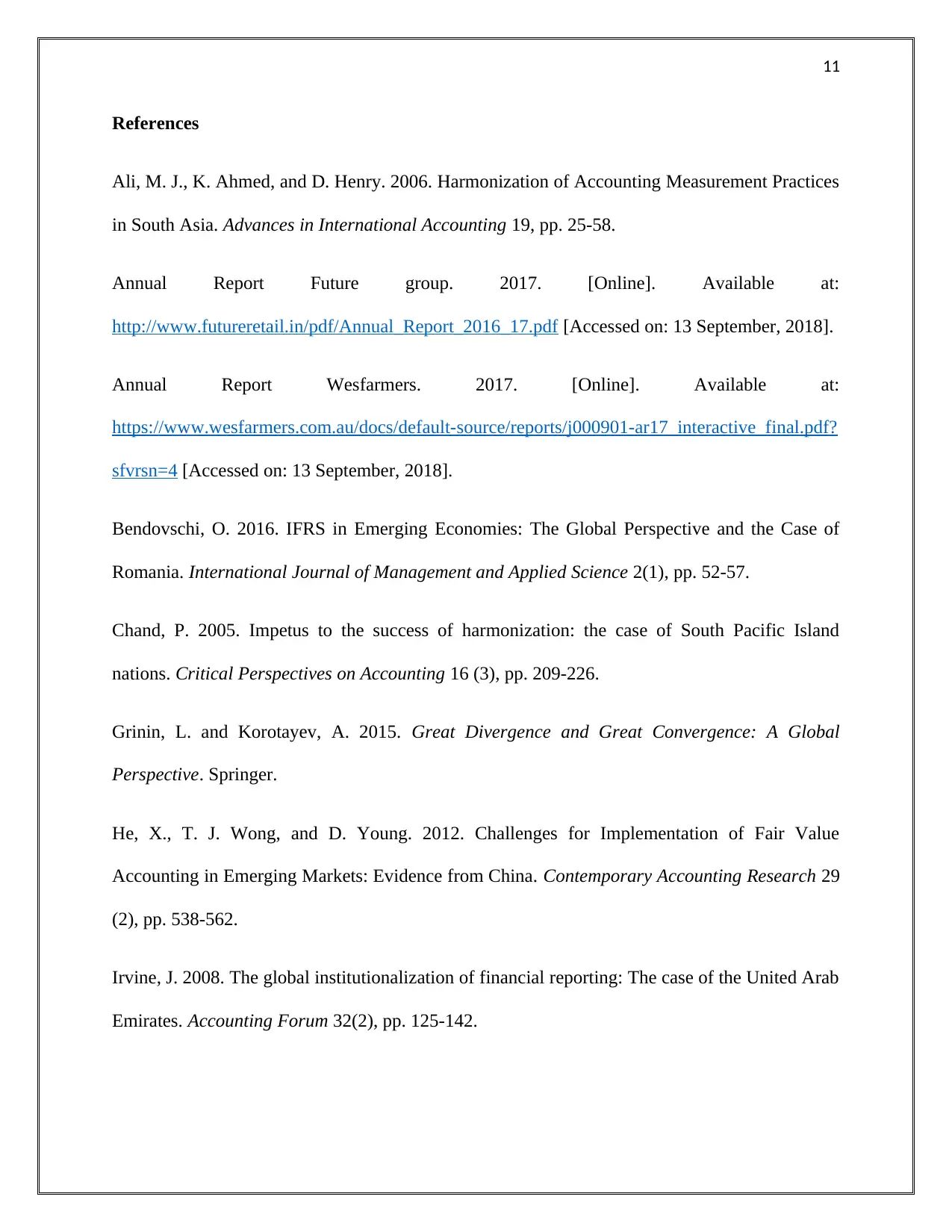
11
References
Ali, M. J., K. Ahmed, and D. Henry. 2006. Harmonization of Accounting Measurement Practices
in South Asia. Advances in International Accounting 19, pp. 25-58.
Annual Report Future group. 2017. [Online]. Available at:
http://www.futureretail.in/pdf/Annual_Report_2016_17.pdf [Accessed on: 13 September, 2018].
Annual Report Wesfarmers. 2017. [Online]. Available at:
https://www.wesfarmers.com.au/docs/default-source/reports/j000901-ar17_interactive_final.pdf?
sfvrsn=4 [Accessed on: 13 September, 2018].
Bendovschi, O. 2016. IFRS in Emerging Economies: The Global Perspective and the Case of
Romania. International Journal of Management and Applied Science 2(1), pp. 52-57.
Chand, P. 2005. Impetus to the success of harmonization: the case of South Pacific Island
nations. Critical Perspectives on Accounting 16 (3), pp. 209-226.
Grinin, L. and Korotayev, A. 2015. Great Divergence and Great Convergence: A Global
Perspective. Springer.
He, X., T. J. Wong, and D. Young. 2012. Challenges for Implementation of Fair Value
Accounting in Emerging Markets: Evidence from China. Contemporary Accounting Research 29
(2), pp. 538-562.
Irvine, J. 2008. The global institutionalization of financial reporting: The case of the United Arab
Emirates. Accounting Forum 32(2), pp. 125-142.
References
Ali, M. J., K. Ahmed, and D. Henry. 2006. Harmonization of Accounting Measurement Practices
in South Asia. Advances in International Accounting 19, pp. 25-58.
Annual Report Future group. 2017. [Online]. Available at:
http://www.futureretail.in/pdf/Annual_Report_2016_17.pdf [Accessed on: 13 September, 2018].
Annual Report Wesfarmers. 2017. [Online]. Available at:
https://www.wesfarmers.com.au/docs/default-source/reports/j000901-ar17_interactive_final.pdf?
sfvrsn=4 [Accessed on: 13 September, 2018].
Bendovschi, O. 2016. IFRS in Emerging Economies: The Global Perspective and the Case of
Romania. International Journal of Management and Applied Science 2(1), pp. 52-57.
Chand, P. 2005. Impetus to the success of harmonization: the case of South Pacific Island
nations. Critical Perspectives on Accounting 16 (3), pp. 209-226.
Grinin, L. and Korotayev, A. 2015. Great Divergence and Great Convergence: A Global
Perspective. Springer.
He, X., T. J. Wong, and D. Young. 2012. Challenges for Implementation of Fair Value
Accounting in Emerging Markets: Evidence from China. Contemporary Accounting Research 29
(2), pp. 538-562.
Irvine, J. 2008. The global institutionalization of financial reporting: The case of the United Arab
Emirates. Accounting Forum 32(2), pp. 125-142.
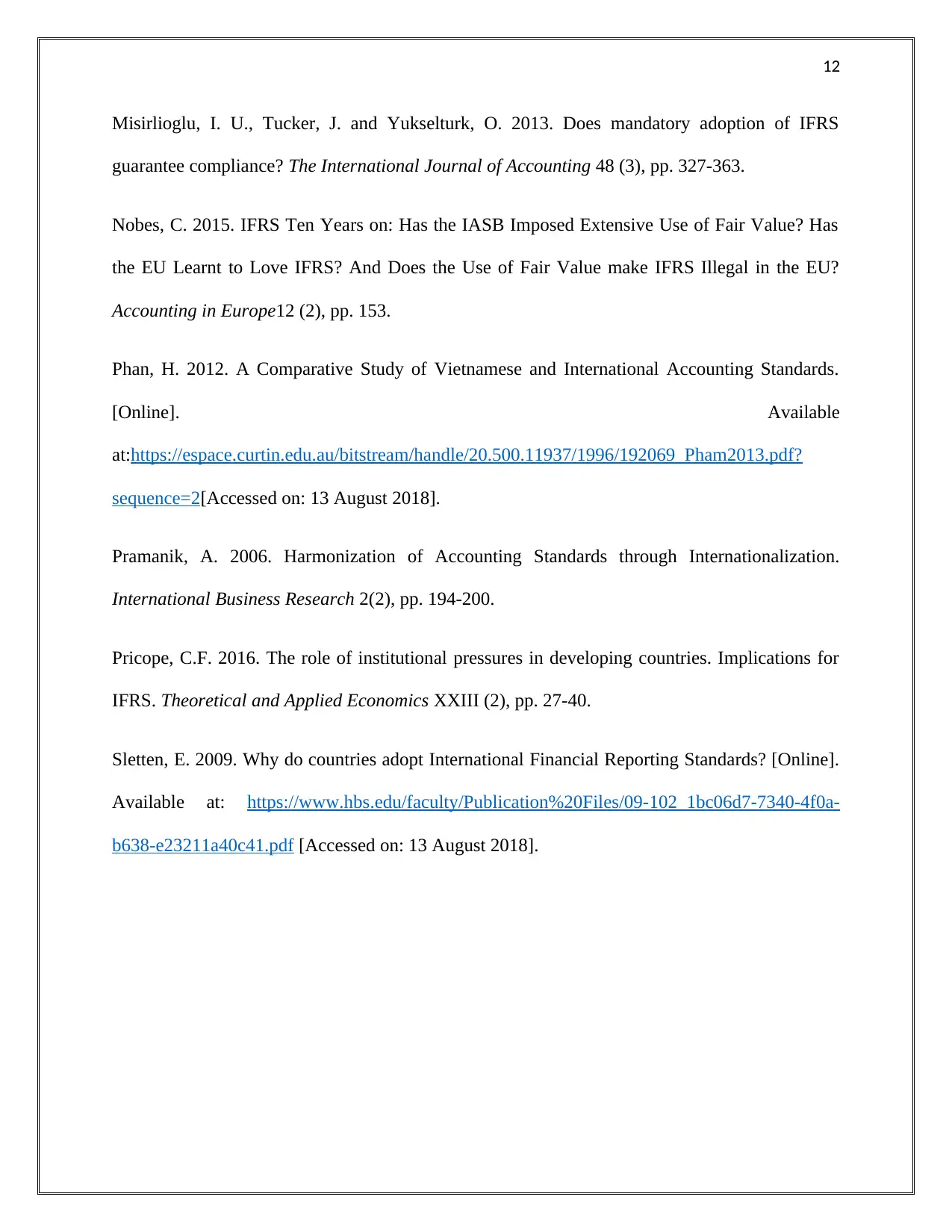
12
Misirlioglu, I. U., Tucker, J. and Yukselturk, O. 2013. Does mandatory adoption of IFRS
guarantee compliance? The International Journal of Accounting 48 (3), pp. 327-363.
Nobes, C. 2015. IFRS Ten Years on: Has the IASB Imposed Extensive Use of Fair Value? Has
the EU Learnt to Love IFRS? And Does the Use of Fair Value make IFRS Illegal in the EU?
Accounting in Europe12 (2), pp. 153.
Phan, H. 2012. A Comparative Study of Vietnamese and International Accounting Standards.
[Online]. Available
at:https://espace.curtin.edu.au/bitstream/handle/20.500.11937/1996/192069_Pham2013.pdf?
sequence=2[Accessed on: 13 August 2018].
Pramanik, A. 2006. Harmonization of Accounting Standards through Internationalization.
International Business Research 2(2), pp. 194-200.
Pricope, C.F. 2016. The role of institutional pressures in developing countries. Implications for
IFRS. Theoretical and Applied Economics XXIII (2), pp. 27-40.
Sletten, E. 2009. Why do countries adopt International Financial Reporting Standards? [Online].
Available at: https://www.hbs.edu/faculty/Publication%20Files/09-102_1bc06d7-7340-4f0a-
b638-e23211a40c41.pdf [Accessed on: 13 August 2018].
Misirlioglu, I. U., Tucker, J. and Yukselturk, O. 2013. Does mandatory adoption of IFRS
guarantee compliance? The International Journal of Accounting 48 (3), pp. 327-363.
Nobes, C. 2015. IFRS Ten Years on: Has the IASB Imposed Extensive Use of Fair Value? Has
the EU Learnt to Love IFRS? And Does the Use of Fair Value make IFRS Illegal in the EU?
Accounting in Europe12 (2), pp. 153.
Phan, H. 2012. A Comparative Study of Vietnamese and International Accounting Standards.
[Online]. Available
at:https://espace.curtin.edu.au/bitstream/handle/20.500.11937/1996/192069_Pham2013.pdf?
sequence=2[Accessed on: 13 August 2018].
Pramanik, A. 2006. Harmonization of Accounting Standards through Internationalization.
International Business Research 2(2), pp. 194-200.
Pricope, C.F. 2016. The role of institutional pressures in developing countries. Implications for
IFRS. Theoretical and Applied Economics XXIII (2), pp. 27-40.
Sletten, E. 2009. Why do countries adopt International Financial Reporting Standards? [Online].
Available at: https://www.hbs.edu/faculty/Publication%20Files/09-102_1bc06d7-7340-4f0a-
b638-e23211a40c41.pdf [Accessed on: 13 August 2018].
⊘ This is a preview!⊘
Do you want full access?
Subscribe today to unlock all pages.

Trusted by 1+ million students worldwide
1 out of 12
Related Documents
Your All-in-One AI-Powered Toolkit for Academic Success.
+13062052269
info@desklib.com
Available 24*7 on WhatsApp / Email
![[object Object]](/_next/static/media/star-bottom.7253800d.svg)
Unlock your academic potential
© 2024 | Zucol Services PVT LTD | All rights reserved.





